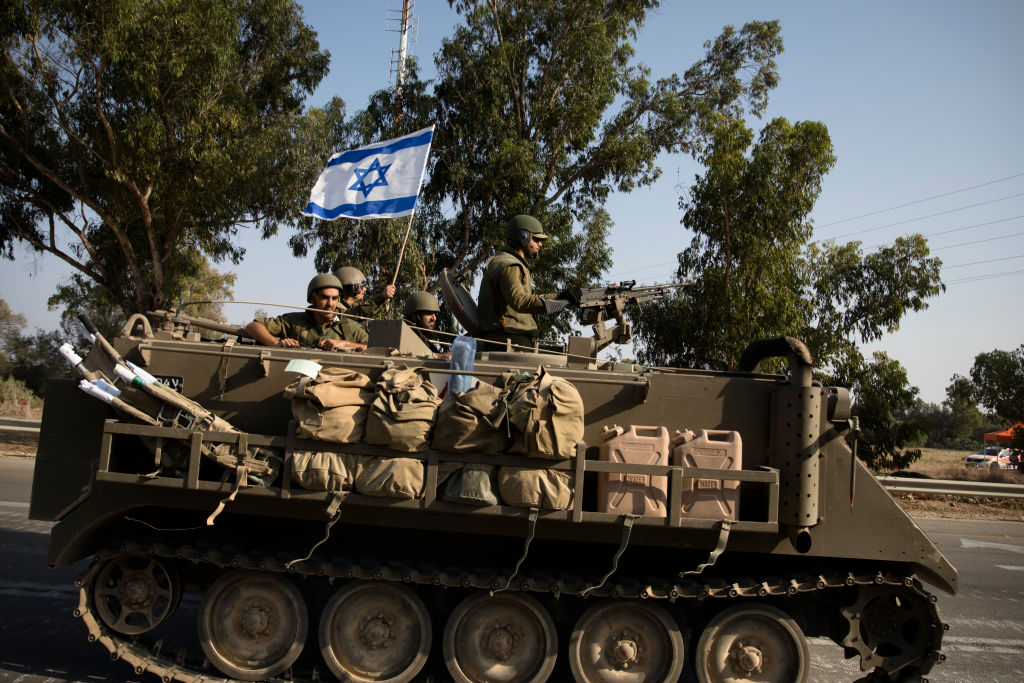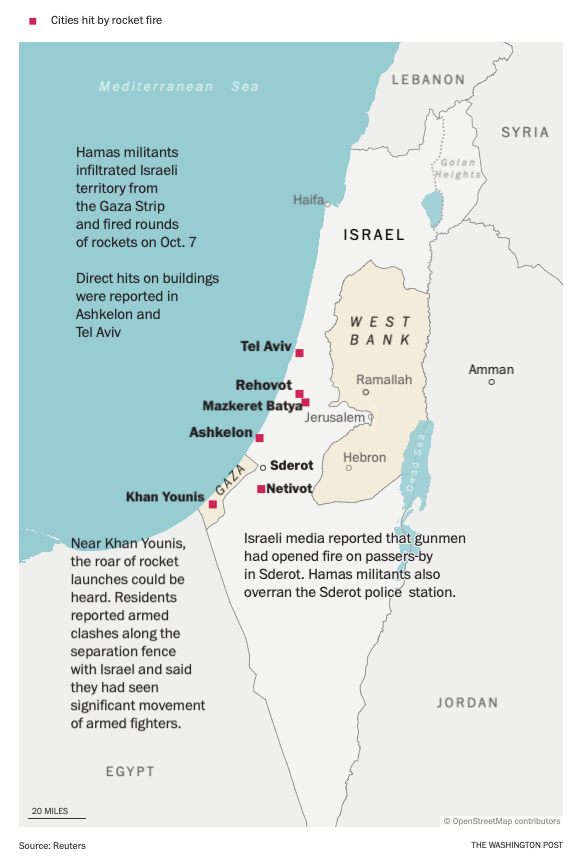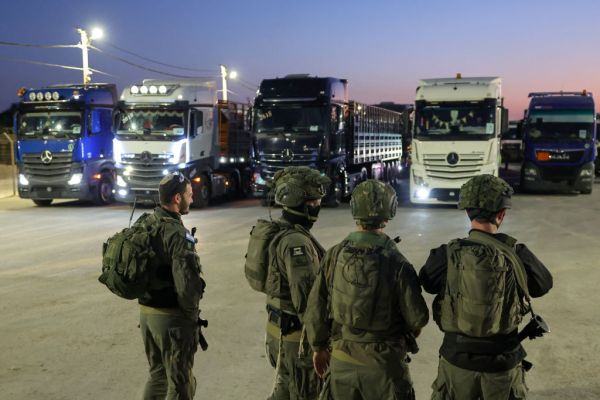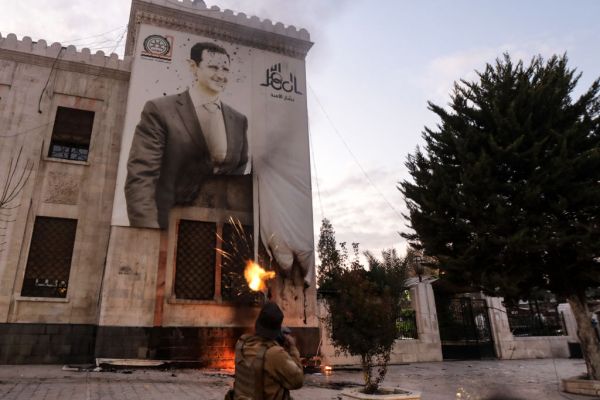It is Monday. War exploded in the Middle East over the weekend as Hamas terrorists launched an all-out assault on Israel. The death toll is still climbing—marking the deadliest weekend in Israel in decades.
Quick Hits: Today’s Top Stories
- Hamas launched a surprise terrorist attack on Israel over the weekend, firing thousands of rockets at the country and sending hundreds of terrorist fighters into cities and towns in southern Israel. Hamas fighters killed hundreds of civilians—including women and children—and kidnapped more than 100 people, taking them back into Gaza as hostages. Israel declared war on Hamas—Prime Minister Benjamin Netanyahu said Israel would “destroy” the group and “take mighty vengeance for this black day.” As of Monday morning, Israeli Defense Forces were still clearing parts of Israeli territory of terrorists. The United States announced additional military assistance will be sent to Israel, and the Ford carrier strike group will sail to the Eastern Mediterranean to be in a position to assist Israel if necessary. The attack came amid U.S.-brokered normalization talks between Saudi Arabia and Israel, which may now be at risk: The Saudi Foreign Ministry called for de-escalation and suggested the war is the result of the Israeli occupation of Palestinian territory.
- Two 6.3-magnitude earthquakes hit Western Afghanistan on Saturday, killing more than 2,400 people and injuring another 2,400, according to Afghanistan’s disaster-management authority. The quakes struck near the city of Herat, leveling more than 1,000 homes and destroying 10 villages, according to local officials. As of Sunday, many dead and injured remained trapped as rescuers searched through the rubble.
- Russia withdrew most of its Black Sea Fleet from its central base in Crimea, moving several ships from Sevastopol to Novorossiysk, a Russian port on the Black Sea. The withdrawal marks a significant setback for the Russian navy and comes after Ukrainian missile and drone attacks destroyed Russian naval vessels and the fleet’s headquarters in Sevastopol.
- Russia said Friday that the country will revoke its ratification of the Comprehensive Nuclear-Test-Ban Treaty, which bans experimental tests of nuclear explosions. The move comes after Russian President Vladimir Putin announced his nation’s successful test of a next-generation weapon. The treaty has been signed by 187 nations—and ratified by 178. The U.S. and China have both signed, but not ratified, the document.
- A bipartisan group of senators—led by Sen. Charles Schumer of New York—arrived in Shanghai on Saturday for a series of meetings with the leaders of the largest economy in Asia. “We are the two biggest economies in the world and it behooves the world that we can get along,” said Sen. Schumer in his meeting with Chen Jining, secretary of the Shanghai Communist Party. “We are prepared to compete but do not seek conflict.” In its crusade for economic fairness, the bipartisan delegation will also meet with officials from South Korea and Japan—and ultimately hopes to lay the groundwork for a meeting with Chinese President Xi Jinping.
- The Bureau of Labor Statistics reported Friday that U.S. employers added 336,000 jobs in September—the sharpest gain since January of this year. Both the unemployment rate and the labor force participation rate remained unchanged at 3.8 percent and 62.8 percent, respectively, while average hourly earnings—a measure the Federal Reserve is watching closely in its fight against inflation—rose another 0.2 percent month-over-month in September, and 4.2 percent year-over-year.
- Republican lawmakers are expected to pick their nominee for speaker of the House in the coming days after Rep. Kevin McCarthy was ousted from the post last week. Rep. Steve Scalise of Louisiana, the current majority leader, and Rep. Jim Jordan of Ohio, chairman of the House Judiciary Committee, are both vying for the position. Rep. Kevin Hern, an Oklahoma lawmaker and chair of the Republican Study Committee, took himself out of the running over the weekend. Scalise and Jordan have each secured dozens of endorsements from their colleagues, but former President Donald Trump threw his weight behind Jordan late last week. The House GOP is scheduled to hold a closed-door candidate forum on Tuesday and a conference vote on Wednesday—the winner of the majority of the conference vote would then face a vote of the full House to become speaker.
- Kaiser Permanente employees returned to work on Saturday, days after 75,000 health care workers walked off the job as part of the largest health care strike in U.S. history. The strike ended before new contracts had been signed, and negotiations are set to resume this week.
- United Auto Workers union members at Mack Trucks shot down a proposed contract agreement and voted to go on strike on Sunday night. As many as 4,000 members will go on strike at 7 a.m., joining the 25,000 UAW members on strike against the big three car manufacturers, General Motors, Ford, and Stellantis.
Israel Under Attack

TEL AVIV, Israel—Families across Israel awoke Saturday morning to air-raid sirens signaling incoming rockets from Hamas-run Gaza and swarms of terrorists within their borders. By the end of the day, more than 300 Israeli civilians and soldiers were confirmed dead—with more than 2,000 wounded and 100 kidnapped—marking the country’s deadliest single day since the Yom Kippur War in 1973.
And all indications are Saturday was just the start of a painful, protracted conflict. Within hours, Israel had declared war on Hamas.
“We are at war, not an operation or in rounds, but at war. This morning, Hamas launched a murderous surprise attack against the State of Israel and its citizens,” Israeli Prime Minister Benjamin Netanyahu said in a mid-day televised address. “The enemy will pay an unprecedented price.”
Rocket fire continued into Monday morning, but at the time of this newsletter’s publishing, more than 1,100 people have been confirmed dead in the terrorist attacks and retaliatory strikes, including 700 Israelis, 430 Palestinians, and at least four Americans. More than 100 others who were taken captive during the terrorist raids on Saturday remain in Gaza as hostages with dwindling hope for rescue. Details are still murky, but senior members of both Hamas and Hezbollah have suggested that Iranian security officials helped plan the assault—and officially sanctioned the attack last Monday. The Israeli military is now readying its forces for the prospect of a multifront conflict, calling up thousands of reservists to fortify the northern front and prepare for war with Hamas in Gaza.
The onslaught began on the Jewish holiday of Simchat Torah, which this year fell on Shabbat. But the attack’s timing may have had another purpose: It came one day after the 50th anniversary of the Yom Kippur War, a surprise offensive by Egypt and Syria that nearly spelled the end of Israel.
Hamas’ opening salvo came in the form of thousands of rockets targeting southern and central Israel. By 10:30 a.m. on Saturday morning, Hamas had reportedly launched 2,200 rockets, and that tally grew significantly on Sunday. Most of the projectiles were intercepted by Israel’s Iron Dome air defense systems, but the sheer volume of the onslaught allowed for the all-day barrage to overwhelm the Iron Dome in residential areas across the country—with deadly results. Israeli Defense Forces (IDF) officials told The Dispatch that at least 45 rockets had made direct hits as of Sunday morning, including two in Tel Aviv, Israel’s second-largest city and the site of many diplomatic missions from around the world. (The Dispatch’s Charlotte Lawson is also based in the city.)
As the explosions rang out across Israel on Saturday, hundreds of terrorist fighters launched air, sea, and ground incursions into southern Israeli territory, taking hostages and summarily executing civilians on the streets and in their homes. Reports of Palestinian gunmen roaming the streets of Israel began to emerge early Saturday morning, along with footage of bulldozers destroying fencing and trucks of armed terrorists crossing into Israeli territory undeterred. Other militants entered the country using motorized paragliders, and some attempted to attack from the sea before being thwarted by the Israeli Navy.
“Hundreds [of our people] have been martyred and injured this year due to the occupation’s crimes,” said Mohammed Deif—commander of Al-Qassam Brigades, the military wing of Hamas—in justifying the attack. “Our calls for a humanitarian [prisoners] exchange were met with refusal, and daily violations continue in the West Bank.” Deif labeled the attack the “Al-Aqsa Flood” in tribute to the Muslim holy site in Jerusalem. “Today, the people reclaim their revolution, correct their path, and return to the march of return.”
We are very much still in the fog of war, and cannot be sure exactly what’s true and what’s false—especially given the amount of claims being made on both sides of the conflict. But sifting through the flood of information, here is what we think we know:
Within minutes of the attacks’ outset on Saturday, extensive documentation of war crimes began to circulate on pro-militant media channels—much of it shared by the terrorists themselves in an apparent effort to generate support for their cause—including images of elderly people gunned down while waiting for the bus and footage of terrorists dragging their captives back to the Gaza Strip. In one video, Hamas fighters in Gaza appear to be parading around and spitting on the mostly nude corpse of a woman who has since been identified as a German tattoo artist. In another, an elderly Israeli woman was taken hostage and driven through the streets by her captors. Terrorists also reportedly opened fire on an all-night music festival in the Negev desert, leading to dramatic scenes—shared widely among Hamas’ supporters, including Iranian Supreme Leader Ali Khamenei—of partygoers fleeing on foot and in cars. The death toll at this site alone has climbed to more than 260 individuals, and eyewitnesses have described widespread sexual violence by the attackers.
In cities and communities near Gaza, gunmen occupied buildings and launched armed attacks against Israeli security forces, even taking over a police station in Sderot. Hamas fighters also reportedly overran an IDF military base near the border, killing and capturing soldiers and stealing equipment, including tanks.
Israel’s immediate priority is to expel the terrorists and retaliate against Hamas—the IDF said Monday morning it had regained control of Gaza border towns—but eventually the country will have to reckon with how such an attack occurred in the first place given its apparent scope and Israel’s extensive intelligence capabilities. From Israel’s perspective, however, that is a conversation for another day. “I know there are a lot of questions about the intelligence,” IDF spokesman Richard Hecht said. “Please stop asking. Right now we’re fighting. I’m sure there will be a lot of discussions about the intelligence down the road.”

(Map via Reuters and the Washington Post.)
Militants crossed from Gaza through Israel’s defenses using bulldozers to tear holes in barriers and fences. The Israeli military was uncharacteristically slow to respond, and the barrage of a record number of missiles overwhelmed Israel’s Iron Dome, its complex missile defense system. The once-impenetrable defense, now breached, has left citizens shaken. “This was always the nightmare,” said Jehan Berman, who was living near Gaza. “We told ourselves that one day, the terrorists will come inside here.”
Israel’s response was forceful. The nation’s air force launched strikes across the Gaza strip on Saturday, hitting more than a dozen Hamas military outposts. Israeli security forces began clearing out infiltrators and carried on into the night, but some residents of southern Israel said they were barricaded in bomb shelters for hours before help eventually came. There were still terrorist fighters within Israel as of Sunday night, an IDF spokesman said, vowing to find them “wherever they are.”
In Gaza, an estimated hundred people—reportedly including Americans—are still in terrorist captivity. “Both soldiers and civilians. Some of them are dead, some of them are alive. Some of them are children, some of them are women,” Maj. Nir Dinar, a spokesman for the IDF, told The Dispatch. “It’s not going to be a rescue operation. It’s going to be a war in which we will be very, very happy to find these kidnapped people alive and bring them back to their homes.”
The Israeli government has given the green light for “significant military steps” in responding to the surprise attack, including what is likely to be a significant ground war in Gaza. The IDF announced “Operation Iron Swords” on Saturday following the attacks, repositioning troops to reinforce the North, near the border with Lebanon, and prepare for the prospect of a ground incursion into Gaza. At the same time, the Israeli Air Force has been conducting airstrikes targeting Hamas infrastructure across Gaza. The aerial campaign has killed at least 430 Palestinians, Gaza’s Hamas-run health ministry said Monday.
In a ground war, we can expect the death tolls on both sides to rise considerably. Hezbollah, the Lebanese militant group, has threatened to become more involved in the fight in such an event, having already conducted rocket attacks against Israeli military targets along the northern front. With the prospect of a multifront war looming, the IDF may need to decide which arena to prioritize. “A war in multiple fronts could stretch our forces,” Dinar acknowledged. “It could be a problem.”
To many analysts, the potential involvement of Iranian-backed Hezbollah strengthens the argument that all roads lead back to Tehran. And the Islamic Republic hasn’t been shy in its celebration of Hamas’ victories. During a meeting of the Iranian parliament on Saturday, lawmakers chanted “Death to Israel” and “Palestine Will Be Victorious, Israel Will Be Destroyed” as the onslaught unfolded. Supreme Leader Ali Khamenei has also been vocal in his support for the attackers.
“The usurper regime is coming to an end,” he tweeted on Saturday. “Today, the Palestinian youth and the anti-oppression, anti-occupation movement in Palestine is more energetic, more alive, and more prepared than ever during the past 70 or 80 years. God willing, the movement will achieve its goals.”
More accurately, the attacks on Israel appear to reflect the will of the Iranian leader: Citing “senior members of Hamas and Hezbollah,” the Wall Street Journal reported Sunday that Iranian officials helped plan the complex attack—going so far as to give final signoff on the campaign’s execution last Monday. Leaders of Iran’s Islamic Revolutionary Guard Corps allegedly began coordinating with Hamas on the multilateral attacks at meetings in Beirut in August. Biden administration officials said Sunday that U.S. intelligence has yet to independently confirm such reports, which Iran has denied, but the rumored support only fuels speculation that Tehran was working to sabotage the U.S.-driven attempt to negotiate the normalization of relations between Israel and Saudi Arabia.
“There’s no way Iran did not know about this and was not involved,” Joe Truzman, a Foundation for Defense of Democracies analyst focused on Palestinian terror groups, tells The Dispatch. “We identified 19 armed groups on Israel’s borders. This includes Gaza, Lebanon, Syria, the West Bank, and Iraqi groups operating in Syrian territory. These groups are all funded and armed and of course supported by Iran, with the aim of killing Israeli civilians and attacking Israeli military targets.”
The attack may also have been a way for Iran and its proxies to test Israel’s resolve during a period of internal strife. Protests over the Netanyahu government’s controversial judicial reform plan had carried on for months prior to this weekend, with some reservists threatening to go on strike. But the invasion was met with a unified response within Israel. “Every one of the reservists showed up,” Dinar said. “People that we didn’t call also came.”
Outside of the Middle East, the attack on Israel has been largely met by outrage and denunciations of Hamas. China took a more equivocating approach, reiterating its support for a two-state solution to the Israeli-Palestinian conflict, while calling for an “immediate ceasefire.” But Canada, the United Kingdom, Germany, and France all publicly affirmed their support for Israel and condemned the attacks—as did the European Commission and NATO. Ukrainian President Volodymyr Zelensky, too, posted a message in support of Israel: “Israel has the full right to defend itself against terror. As any other state.”
With a few notable exceptions, the response in the U.S. has been similarly steadfast. The administration’s Office of Palestinian Affairs initially posted a statement condemning Hamas terrorists and calling on “all sides to refrain from violence and retaliatory attacks,” but the statement was deleted and replaced by more forceful language from the president himself. “The United States stands with Israel,” Biden said in remarks Saturday afternoon. “We will not ever fail to have their back. We’ll make sure they have the help their citizens need and they can continue to defend themselves.”
A number of prominent Republicans jumped on the Biden administration, however, pinning at least part of the blame for the attack on the president for projecting a weak global image, emboldening Israel’s enemies, and releasing $6 billion in blocked Iranian funding in return for the freeing of five detained Americans—money they contend could have been used in the planning of the attack.
American aircraft carriers are moving into the Mediterranean Sea to support Israeli forces, and the president has stressed that the U.S. stands “rock solid” with Israel—backing up these words with a shipment of additional munitions. The House of Representatives is limited in its official capabilities without a speaker—though some are moving to officially condemn Hamas even before a speaker can be elected. Senate Democrats are also pushing to quickly confirm the administration’s pick for the ambassador to Israel, Jack Lew. Two U.S. lawmakers—Rep. Dan Goldman of New York and Sen. Cory Booker of New Jersey—were in Israel over the weekend, and have since evacuated.
A handful of progressive Democratic lawmakers have issued statements seeming to excuse Hamas’ barbarism—laying it at the feet of Israel’s “occupation” and “apartheid government,” in Democratic Rep. Rashida Tlaib’s case—and a New York City chapter of the Democratic Socialists of America endorsed a rally in Times Square on Sunday where attendees chanted “Resistance is justified when people are occupied.” New York’s Democratic Gov. Kathy Hochul and Democratic Rep. Ritchie Torres of New York condemned the rally. “The NYC-DSA is revealing itself for what it truly is: an antisemitic stain on the soul of America’s largest city,” Torres wrote. “There is a special place in hell for those who glorify the cold-blooded murder of civilians and children.”
For now, though, the fighting is expected to continue in the coming days, and the world is holding its breath at the prospect of an even broader conflict. If and when the ground war in Gaza begins, Truzman warns, more groups may be pulled into the fight in one form or another. “I’m very concerned that if Israel launches a ground war into Gaza, these other fronts will be ignited—Lebanon, Syria, to a certain extent the West Bank,” he says. “This is Israel’s worst nightmare since the Yom Kippur War.”
Worth Your Time
- In times of war and struggle, we often rely on the media to present us with up-to-the minute breaking information. It can be easy to forget, amidst the chaos, that reporters are human too. CNN correspondent Nic Robertson reminded audiences of the mental toll such devastation can take as he choked back tears while reporting on the hostage situation unfolding in Israel and describing an interview with an Israeli official. “I asked him, ‘How are you going [to get] these hostages back?’” Joe DePaolo wrote in a recap of the segment. “Robertson took a moment to gather himself before resuming his report. ‘He told me that they were going to do everything in their power to get them back,’ Robertson said. ‘No one would be left behind, he said. But I think I picked up from him the extreme difficulty that is presented here. Because Hamas won’t give them up. And where they’re scattered, where they’re being held, underground tunnels, bunkers scattered across Gaza, it is an almost impossible task.’”
Presented Without Comment
Wall Street Journal: Russia Seeks Seat on U.N. Human Rights Panel After Ejection Over Ukraine War
Toeing the Company Line
- Michael, our managing editor, answered your questions October’s Monthly Mailbag (🔒).
- In the newsletters: The Dispatch Politics crew outlined the contours of the speakership race, Harvest and Haley covered (🔒) the prospects of additional Ukraine aid, Nick explained (🔒) the insider-outsider dynamic of the Scalise-Jordan speakership battle, Chris broke down (🔒) filing deadlines and the primary season, and Jonah explained why the origins of identity politics don’t matter.
- On the podcasts: Luis talked to economist Melissa Kearney about the importance of two-parent households, Jonah ruminated on the crisis at the southern border, student loan debt forgiveness, and Biden’s declining credibility, before jumping on our new members-only podcast feed—The Skiff (🔒)—with Adaam to discuss the outbreak of war in Israel. Due to the importance of the story, we are also releasing the conversation to all as a bonus Remnant episode.
- On the site over the weekend: Rachel Ferguson reviewed Yascha Mounk’s new book, The Identity Trap, and David Mason revisited Robert Frost’s New Hampshire on its centennial.
- On the site today: Will McBride explains the implication of the speakership battle for the national debt.
Let Us Know
How do you think we will look back on the events of Saturday a year from now? Twenty years from now?










Please note that we at The Dispatch hold ourselves, our work, and our commenters to a higher standard than other places on the internet. We welcome comments that foster genuine debate or discussion—including comments critical of us or our work—but responses that include ad hominem attacks on fellow Dispatch members or are intended to stoke fear and anger may be moderated.
You are currently using a limited time guest pass and do not have access to commenting. Consider subscribing to join the conversation.
With your membership, you only have the ability to comment on The Morning Dispatch articles. Consider upgrading to join the conversation everywhere.